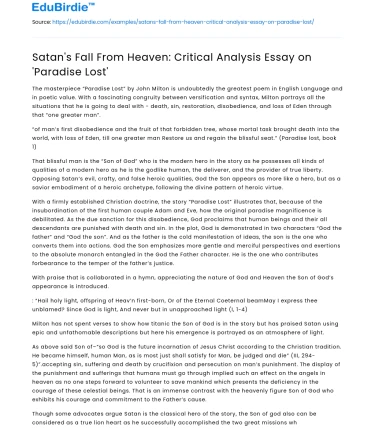The masterpiece “Paradise Lost” by John Milton is undoubtedly the greatest poem in English Language and in poetic value. With a fascinating congruity between versification and syntax, Milton portrays all the situations that he is going to deal with - death, sin, restoration, disobedience, and loss of Eden through that “one greater man”.
“of man’s first disobedience and the fruit of that forbidden tree, whose mortal task brought death into the world, with loss of Eden, till one greater man Restore us and regain the blissful seat.” (Paradise lost, book 1)
Save your time!
We can take care of your essay
- Proper editing and formatting
- Free revision, title page, and bibliography
- Flexible prices and money-back guarantee
That blissful man is the “Son of God” who is the modern hero in the story as he possesses all kinds of qualities of a modern hero as he is the godlike human, the deliverer, and the provider of true liberty. Opposing Satan’s evil, crafty, and false heroic qualities, God the Son appears as more like a hero, but as a savior embodiment of a heroic archetype, following the divine pattern of heroic virtue.
With a firmly established Christian doctrine, the story “Paradise Lost” illustrates that, because of the insubordination of the first human couple Adam and Eve, how the original paradise magnificence is debilitated. As the due sanction for this disobedience, God proclaims that human beings and their all descendants are punished with death and sin. In the plot, God is demonstrated in two characters “God the father” and “God the son”. And as the father is the cold manifestation of ideas, the son is the one who converts them into actions. God the Son emphasizes more gentle and merciful perspectives and exertions to the absolute monarch entangled in the God the Father character. He is the one who contributes forbearance to the temper of the father’s justice.
With praise that is collaborated in a hymn, appreciating the nature of God and Heaven the Son of God’s appearance is introduced.
: “Hail holy light, offspring of Heav’n first-born, Or of the Eternal Coeternal beamMay I express thee unblamed? Since God is light, And never but in unapproached light (I, 1-4)
Milton has not spent verses to show how titanic the Son of God is in the story but has praised Satan using epic and unfathomable descriptions but here his emergence is portrayed as an atmosphere of light.
As above said Son of–“so God is the future incarnation of Jesus Christ according to the Christian tradition. He became himself, human Man, as is most just shall satisfy for Man, be judged and die” (III, 294-5)”.accepting sin, suffering and death by crucifixion and persecution on man’s punishment. The display of the punishment and sufferings that humans must go through implied such an effect on the angels in heaven as no one steps forward to volunteer to save mankind which presents the deficiency in the courage of these celestial beings. That is an immense contrast with the heavenly figure Son of God who exhibits his courage and commitment to the Father’s cause.
Though some advocates argue Satan is the classical hero of the story, the Son of god also can be considered as a true lion heart as he successfully accomplished the two great missions which were commanded by God in Books VI and VII. The goals were to defeat the rebel angels and banish them from heaven to hell, and the second was a mission of peace, to generate new creatures and a new world that will eventually fit in the space in heaven by which are left by the fallen angels. In the battle to crush Satan as in Book VI the third day of the battle, it is very much symbolic. According to Christianity, they believe that when Christ was resurrected on the third day, he conquered death. In Paradise Lost, Death is a son of Satan, so Jesus’s victory over demise is directly correlated with the defeat of Satan. The Prince of Heaven fights alone without receiving any kind of help from the celestial beings and vanquished Satan’s whole army. The same action occurred as Jesus faced crucifixion and death.
“Father, thy word is passed, man shall find grace.
“Behold me then, me for him, life for life offer, on me let thine anger fall
Account me, man, I for his sake will leave” III, 236-7)
His defeating death paves the path of Heaven to man. Although he is immortal, becoming fully human while at the same time fully God, he came down from Heaven and experienced death. Death became no longer a permanent state, but a transition to a new life through resurrection as death loses its hold over man.
“:[...] then rising from his Grave The Realm itself of Stan long usurp,” (VII, 185-6)






 Stuck on your essay?
Stuck on your essay?

